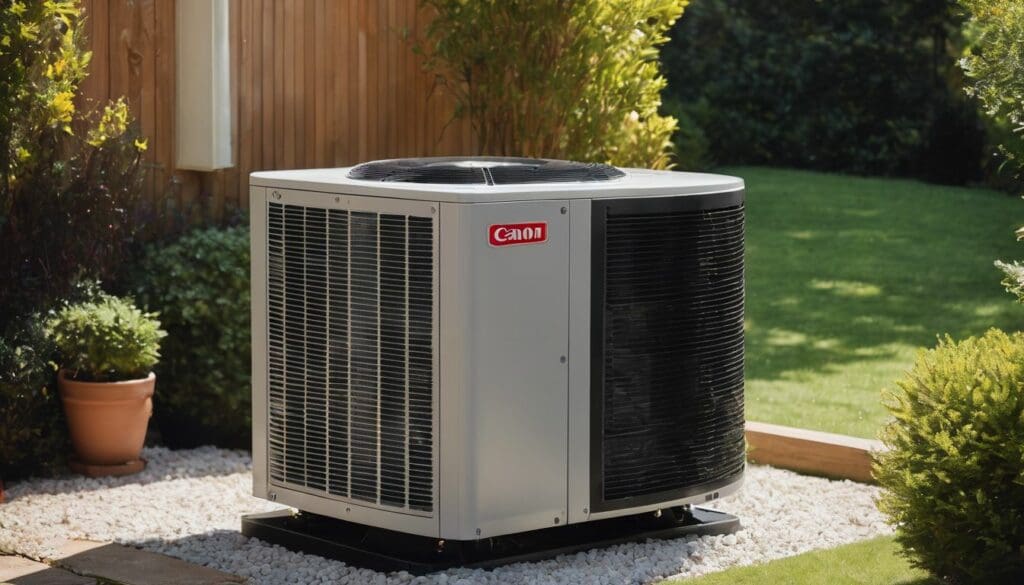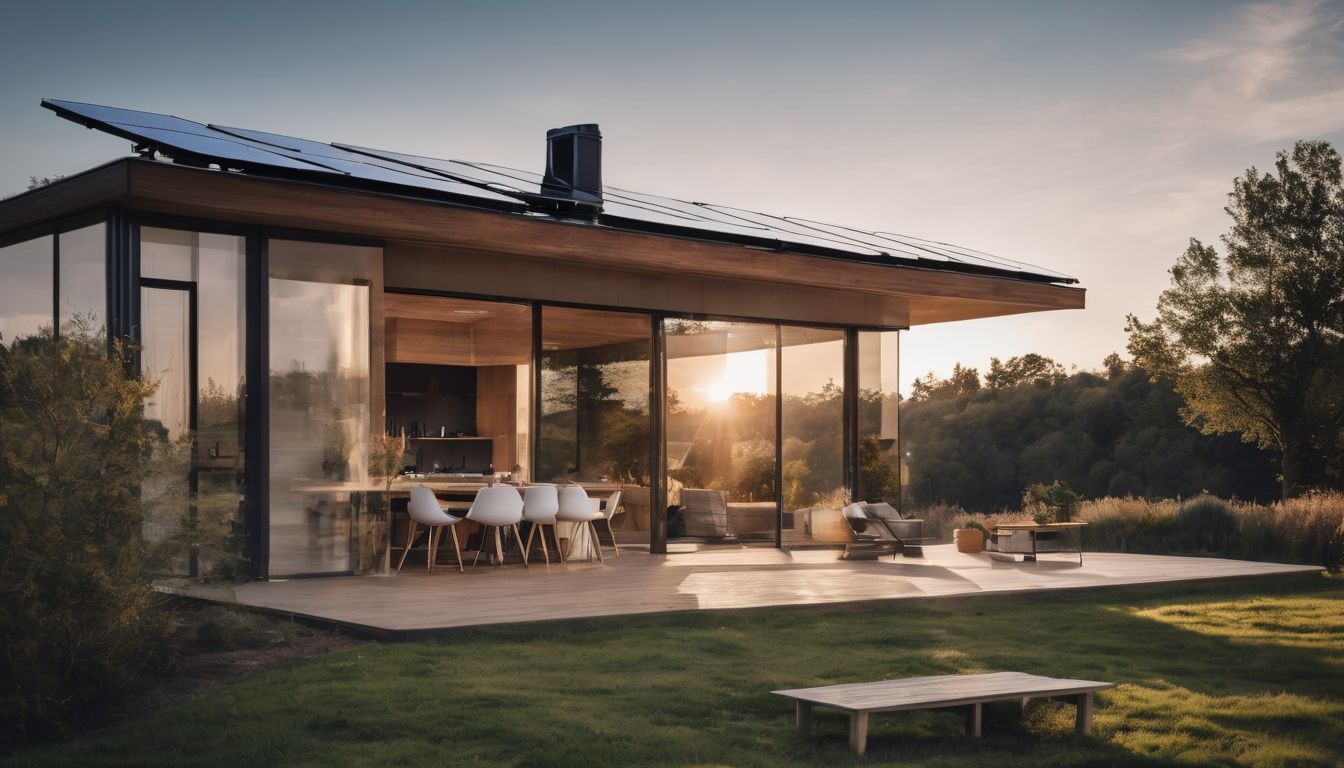As we all seek ways to keep our homes cosy without costing the earth, air source heat pumps stand out as a smart solution. These innovative devices can convert outside air into heat for your home with surprising efficiency.
This article unpacks how these systems not only save money but also play a role in cutting carbon emissions and supporting environmental conservation. Dive in to discover why they’re becoming a heating favourite!
Key Takeaways
- Air source heat pumps are an eco – friendly heating and cooling option, as they use less electricity by converting energy from outside air into heat for indoor spaces.
- Installing an air source heat pump can lead to lower energy bills and may qualify homeowners for government rebates or tax incentives aimed at promoting renewable energy use.
- These systems provide consistent temperatures year – round with the added bonus of zoned temperature control, allowing different areas in a home to be heated or cooled according to individual preferences.
- Air source heat pumps come with high energy efficiency ratings; higher-rated units consume less energy, which leads to greater cost-effectiveness and environmental benefits.
- Despite their advantages, it’s essential to consider potential drawbacks such as reduced effectiveness in extremely cold climates and the initial cost of installation.
What are Air Source Heat Pumps?
Air source heat pumps are innovative systems designed to provide both heating and cooling for your home. They work by transferring heat from the air outside into your house during winter and reversing the process in the summer, effectively acting like an air conditioner.
This technology is not only reliable but also supports sustainable heating by using less energy compared to traditional electric heating methods.
Heat pump technology utilises a refrigerant that absorbs and releases heat as it circulates between indoor and outdoor units. During colder months, the system extracts warmth from the external air—even when temperatures are low—and amplifies this heat before distributing it indoors.
Conversely, in warmer periods, it pulls excess heat from inside your home and releases it outdoors to cool your living space efficiently. Thanks to their versatility and energy-efficient climate control capabilities, these pumps play a pivotal role in reducing overall energy use while maintaining comfortable temperatures year-round.
Benefits of Air Source Heat Pumps
Air source heat pumps offer energy efficiency, cost-saving benefits, improved heating and cooling, zoned temperature control, and quiet operation. These systems provide a sustainable and environmentally-friendly solution for climate control in homes.
Energy efficiency
Air source heat pumps are highly efficient in converting energy into heat, using minimal electricity to generate a significant amount of warmth. This efficiency is crucial for reducing energy consumption and lowering utility bills.
By harnessing renewable energy from the air, these systems help in decreasing overall carbon emissions. The technology involved ensures that the system can maintain high levels of efficiency even in colder temperatures, making them an environmentally friendly choice for sustainable heating and cooling solutions.
The superior energy efficiency of air source heat pumps enables homeowners to create a comfortable living environment while minimising their impact on the planet. With reduced energy use, these systems play a vital role in combating climate change by promoting responsible and efficient home climate control practices.
Cost-saving
One of the significant advantages of air source heat pumps is their cost-saving potential. By efficiently transferring heat from the outside air to your home, these systems can significantly reduce your energy bills.
With lower operational costs and reduced reliance on traditional heating methods, air source heat pumps offer an environmentally friendly and affordable alternative for heating and cooling your living space.
This makes them a compelling choice for individuals looking to decrease their energy consumption while also saving money in the long run.
In addition to reducing your monthly expenses, investing in an air source heat pump may also make you eligible for financial incentives such as government rebates or tax credits aimed at promoting renewable energy usage.
Improved heating and cooling
Air source heat pumps offer improved heating and cooling, providing consistent indoor temperatures throughout the year. They work by extracting heat from the outdoor air during the winter to warm your home efficiently.
In the summer, they reverse this process to cool your home effectively without using a separate air conditioning system. This technology ensures energy-efficient climate control and reduces overall energy consumption while promoting a comfortable home environment.
The improved heating and cooling capabilities of air source heat pumps make them an attractive option for environmentally conscious individuals seeking sustainable HVAC systems that minimise energy use.
Zoned temperature control
Improved heating and cooling ensures a comfortable environment, but zoned temperature control takes it a step further. With this feature, different areas of your home can have their own temperature settings.
This allows for better energy efficiency and personalised comfort, reducing energy use and costs while ensuring that everyone is comfortable in their own space. Zoned temperature control also supports environmentally conscious living by enabling targeted climate control based on specific needs within the home.
Quiet operation
One of the notable advantages of air source heat pumps is quiet operation, creating a peaceful environment in your home. The sound levels are typically comparable to a modern refrigerator, ensuring minimal disturbance as it works efficiently to maintain your desired indoor temperature.
This feature makes air source heat pumps an ideal choice for environmentally conscious individuals seeking energy-efficient and unobtrusive heating and cooling solutions.
Choosing an air source heat pump with quiet operation can enhance environmental harmony within your living spaces while providing reliable climate control.
Pros and Cons of Air Source Heat Pumps
When considering air source heat pumps, it’s important to weigh the pros and cons. Understanding both sides can help you make an informed decision that suits your specific needs and preferences.
Find out more about the benefits and potential drawbacks of this heating and cooling system.
Pros:
Air source heat pumps offer several advantages, making them a sustainable choice for environmentally conscious individuals. They provide exceptional energy efficiency, reducing energy usage and carbon emissions.
Additionally, air source heat pumps are cost-effective, offering long-term savings on heating and cooling bills. Their quiet operation ensures minimal disturbance while providing efficient climate control.
Furthermore, these systems allow zoned temperature control to maximise comfort in different areas of the home.
Cons:
Air source heat pumps have multiple benefits, but they also come with some drawbacks. One potential downside is that they may be less effective in extremely cold climates, where the temperature falls significantly below freezing.
This could lead to reduced efficiency and higher energy consumption as the pump works harder to maintain desired indoor temperatures.
Another consideration is the initial cost of installation, which can be relatively high compared to traditional heating systems. Additionally, some users may find the outdoor unit of air source heat pumps noisy during operation.
How to Choose the Right Heat Pump for Your Home
When choosing the right heat pump for your home, consider the climate in which you live, the size and placement of the unit, as well as its energy ratings. These factors will ensure that you select a heat pump that is suitable for your specific needs and environment.
Consider your climate
When considering your climate, it’s essential to think about the seasonal temperature variations in your area. This will help determine whether an air source heat pump is a suitable and efficient option for heating or cooling your home throughout the year.
Understanding how the heat pump system performs in different weather conditions can guide you in choosing the right one for optimal energy efficiency and comfort.
Once you have considered your climate, other factors such as size and placement of the heat pump, as well as its energy ratings, play crucial roles in ensuring that it operates effectively and efficiently within your specific environmental conditions.
These aspects all contribute to maintaining a comfortable indoor environment while reducing energy consumption and costs.
Size and placement
Choosing the right size and placement of your air source heat pump is crucial for its efficiency. A professional assessment should be carried out to determine the appropriate size needed for your home and where it should be installed.
Factors such as insulation, room layout, and outdoor space will all impact the sizing and positioning of the heat pump.
The correct sizing and strategic placement will ensure optimal performance of your air source heat pump, leading to energy savings and effective heating or cooling throughout your home.
Energy ratings
When choosing an air source heat pump for your home, it’s important to consider its energy ratings. These ratings indicate how efficient the heat pump is in converting energy into heating or cooling output.
A higher rating means lower energy consumption and reduced utility bills, making it a more sustainable choice for environmentally conscious individuals looking to reduce their carbon footprint.
By opting for a heat pump with high energy ratings, you can contribute to energy conservation and support green technology while enjoying efficient climate control.
To ensure maximum efficiency and cost-effectiveness, look for air source heat pumps with high Seasonal Coefficient of Performance (SCOP) or Heating Seasonal Performance Factor (HSPF) ratings.
Conclusion.
In conclusion, air source heat pumps play a crucial role in reducing energy consumption and promoting environmental sustainability. These systems offer efficient heating and cooling solutions while enabling zoned temperature control for maximum comfort.
By choosing the right heat pump for your home, you can benefit from cost savings and reduced carbon footprint. Embracing air source heat pump technology is a step towards embracing renewable energy options for a greener future.
FAQs
1. What makes air source heat pumps important for heating and cooling systems?
Air source heat pumps are vital because they provide energy-efficient climate control, reducing our reliance on traditional heating methods.
2. How do air source heat pumps work to reduce energy use?
These heat pump systems transfer warmth from outside air into your home, which uses less energy than generating new heat, cutting down overall energy use.
3. Can an air source heat pump help with humidity control in my home?
Absolutely! Heat pump technology is designed not just for temperature regulation but also to maintain optimal humidity levels inside buildings.
4. Are there different types of heat pumps besides air source ones?
Yes, besides the trendsetting electric and renewable energy heating capabilities of air-source models, there are also ground source heat pumps that utilise underground temperatures for heating and cooling.
5. Why should I consider switching to a heat pump system over my old heater or cooler?
Switching to a heat pump system can be a smart move as it’s both an environmentally friendly option and more cost-effective in terms of long-term energy savings compared to conventional systems.





